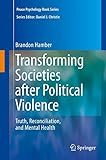Transforming Societies after Political Violence : Truth, Reconciliation, and Mental Health / by Brandon Hamber.
Tipo de material: TextoSeries Peace Psychology Book SeriesEditor: New York, NY : Springer US, 2009Descripción: recurso en líneaTipo de contenido:
TextoSeries Peace Psychology Book SeriesEditor: New York, NY : Springer US, 2009Descripción: recurso en líneaTipo de contenido: - texto
- computadora
- recurso en línea
- 9780387894270
- BF1-990
Springer eBooks
Looking Back, Moving Forward -- Miracles, Trauma and the Truth Commission -- A Tidal Wave of Emotion -- A Place for Healing -- Ambivalence and Closure -- Reparations and Paying for the Past -- Doing Justice -- Assessing Truth and Reconciliation -- Truth Telling and Violence Prevention -- Transforming Transitional Societies.
It is a momentous day for a nation when war is over or a brutal regime ends. For victims and survivors of political atrocities, it is also a time to process trauma, to anticipate the future, to be heard—and to be healed. Transforming Societies after Political Violence offers a template for those tasked with providing truth, justice, reconciliation, and healing. This interdisciplinary study identifies complex relationships between recovery from political violence and the psychological processes that accompany widespread social change, showing how these can be integrated to strengthen both individual and society. Author Brandon Hamber draws on his extensive experience in South Africa and comparative examples from elsewhere to examine the centrality of mental health issues in transitional justice, and the social, cultural, and identity issues involved in meeting the needs of victims. In discussing reparations (what the author terms "repairing the irreparable"), the power of ambivalence, and especially concepts of closure, he eloquently sets out professionals’ roles in helping survivors move beyond the toxic past without covering it up or becoming mired in it. Among the critical areas covered: The vital groundwork that must be made before reconciliation can occur. Creating context-driven approaches to political and social trauma. Assessing truth, documenting the past, and avoiding re-traumatization. The role of mental health professionals in truth commission processes. Survivors as agents for justice, from civic participation to giving public witness. Reparations—symbolic meaning, national value, personal benefits. Promoting reconciliation and preventing further violence. A work that holds profound insight into the meaning of "doing justice," Transforming Transitional Societies is required reading for social and peace psychologists, as well as students and researchers of conflict and peace studies, transitional justice, and intergroup and international relations.
Para consulta fuera de la UANL se requiere clave de acceso remoto.


